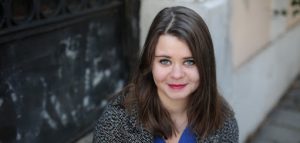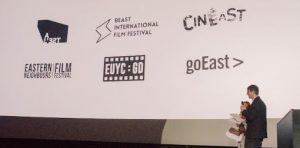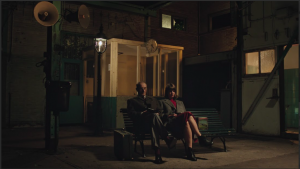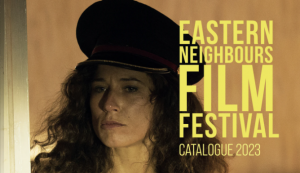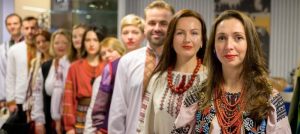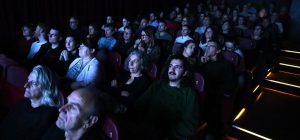
A Roma Director Whose Films Transcend the Misconceptions of Poverty Porn Narratives
Written by Tatjana Lisjak
The last decade has witnessed the emergence of young artists trying to change the narrative and presentation of their Roma community in the arts. Hungarian documentary filmmaker Katalin Barsony is one of those who sees the importance of Roma self-representation and its promotion. She became a well known name after directing the first-ever documentary series on Roma communities, the award-winning half-hour TV magazine “Mundi Romani: A World with Roma Eyes”, whose 42 episodes were filmed in 28 countries. In addition to being a filmmaker, Barsony is a PhD candidate in communication and behavioral sciences, executive director of the oldest Hungarian Roma NGO Romedia Foundation, and the CEO of production company Baxt Films. Next weekend she is presenting her documentary How Far the Stars to a Dutch audience and will give a masterclass & debate on the topic Alter Image – Romani Representation in the XXI Century as part of Eastern Neighbours Film Festival special focus program Romani Stories by Romani (Female) Directors.
Before starting a successful career as a documentary filmmaker, you studied sociology and even did an internship in the European Parliament. What made you move from politics to cinema?
Yes, after finishing my studies I went to work as an intern in the European Parliament, and then for one non-governmental organization in Belgium. My family wanted me to be a diplomat. So I learned French and English, but at one point I got so fed up with the bureaucracy of work and how dry it was. Sometime around that time, the head of Hungarian television launched a show about Roma communities around the world. He thought it would be a good idea for me to run it. It was such a rare opportunity but I was not completely inexperienced in directing back then. I started to work on Hungarian public television, in live broadcasting, between the ages of 16 and 18. This gave me about 200 hours of performance experience at an early age. I had an understanding of how the camera works, how the story is told, how the editing is done. On top of all, my mother is a filmmaker and that had a certain influence.
You are coming to the Netherlands with the acclaimed documentary ”How far the stars?” about Jozsef Balázs, a pianist playing a fusion of modern jazz and traditional Roma music. The two of you met by accident, he played in the bar where you came to the concert. What drew you to him so much? How do you find your heroes and stories?
Jozsef comes from a family of musicians. His brother is a recognized drummer and as a child I listened to his concerts. The experience of making ”Mundi Romani” was very fresh at the time of our meeting. The entire crew and all the resources to start pilot development were at my disposal. So I told him I wanted to record him and build a story around it. We started to develop friendship, talk more and he introduced me to a life of a jazz musician. You see, I am moved by the personal connection and complexity of someone’s life story. My protagonists are always characterized by the fire burning in them. They can express it through conversation, play, art or just words. It needs to be compelling. It is very important that they are open, funny and ready to go deep because documentaries are about exposure. Luckily, most of the people I work with have that fire. My decisions are based on my instinct. It is very difficult to argue this with practical words.
What impressed you the most during filming Balázs and other jazz musicians?
Oh, I was so blown away. I was guided by the way they improvised. It was as if they were talking with their eyes. After following him for months, I asked myself how I could put that into a movie so people can understand it. When they look at each other, you can feel how they change their rhythm, how they communicate with their eyes and know each other so well. And the way they work and produce amazing sounds! I’ve been driven by that very fresh improvised music. That this is happening live, straight in front of you and has a very strong root in our culture. So it definitely involves me in it and creates certain emotions when I hear it.
Speaking of roots, you are very dedicated to promoting Roma self-representation. You took the lead of the Budapest-based 30-year-old NGO Romedia Foundation to influence and change general perception. What is it that you actually do?
Ever since I joined Romedia, and that was fifteen years ago, we have been organizing various projects, cultural events, study camps like a BUVERO where we teach young women to make movies. What we are trying to convey are the values of Roma culture and make everyone aware of how rich and beautiful our culture is. How proud we are of our heritage, including our language, our fairytales, our poetry and art. Roma culture has been influencing European culture for so many years. It’s richness still needs to be revealed to many but it has a lot of potential. Back in 2013, we founded Baxt Films with the idea of producing independant audiovisual products for the European market. Our first collaboration between Romedia and Baxt film is “How Far The Stars?” which has been broadcast in more than 40 countries.
Can you tell us a bit more about the study camp BUVERO? I understood it provides media training for young Roma women. What are your experiences? Have you discovered new talents?
Absolutely, it has been a learning experience, one of the most meaningful projects I’ve done. During the years, about 100 young Roma women from various countries have been trained. Some of them are now filmmakers or working as media professionals. We provide them with practical and theoretical training, explain how to develop their own stories, what filmmaking is, how they can use the available tools to create and give back something to their communities. In many cases, you can see young women coming from disadvantaged backgrounds, very poor conditions, finding a way to use art to amplify their voice and tell their stories.
You said that you are trying to convey the values of Roma culture. What do you think about the representation of the Roma minority in popular culture, misconceptions and prejudices? How do you fight that?
Representation of the Roma minority follows the same path as the average artistic representation of Roma. Stereotypes existed for a long time, in literature, Pushkin’s work, in Victor Hugo’s Esmeralda, then various musical works, as well as in painting before the film actually appeared. This concept of stereotype was introduced into the film industry around the time celluloid was created. The change comes, I think, with the counter-representation around the 1970s when Roma intellectuals first started arguing and debating their own culture and not allowing outsiders to interpret it themselves. Today we are witnessing how the Roma began to reciprocate and create their own feature lenght movies and narratives. It’s unique! We are still trying to deepen our understanding of the Roma counter-narrative and see what that film language and representation bring in films like Hüseyin Tabak’s “The Gypsy Queen,” Veral Lackova’s “How Did I Become a Partisan?”, and Alina Serban’s “Letter of Forgiveness”. My films are self-representations and counter-narratives that try to give an atypical depiction of who we are. You don’t have to see poverty porn in these movies that connect us only to problems and poverty. What you see in these films are lively human characters with their own views and ways of saying things. They are as deep and very real and complex as we are. Human beings.
One of those warm, human stories is the theme of your latest project ”3Brothers”. The pandemic situation also affected its development. When will we have a chance to see it?
It is a long project about a refugee family I found about while filming Mundi Romani in Kosovska Mitrovica. I have been following them for 12 years and will be recording more about them for two weeks in Germany. Then we move on to post-production. “3Brothers” is going well and we hope that it will come out in 2023. I am optimistic that I will be able to produce it regardless of what the war or pandemic brings us.
ROMANI STORIES BY ROMANI (FEMALE) DIRECTORS
18th – 20th March 2022
Kriterion Amsterdam | Filmhuis Den Haag


